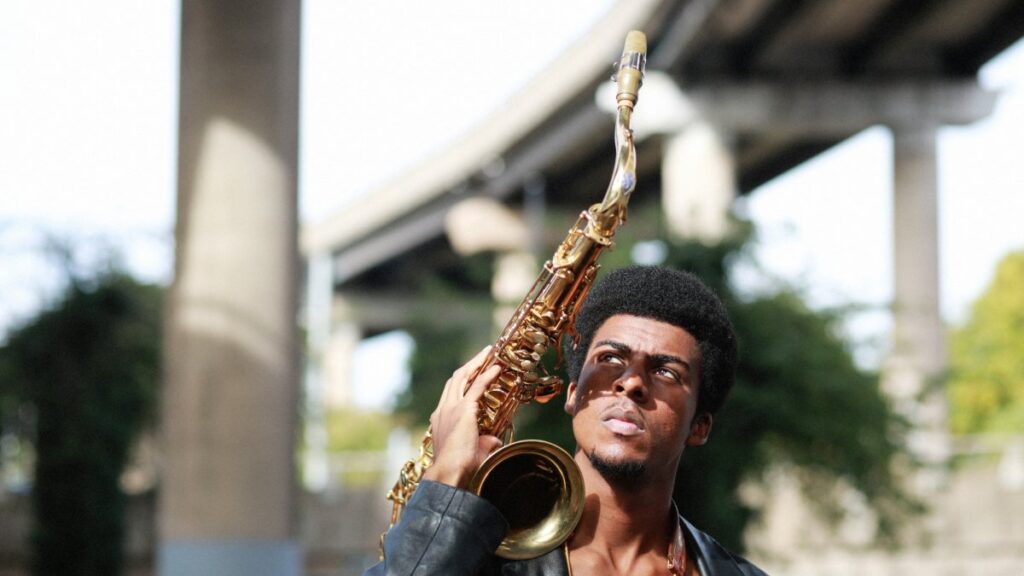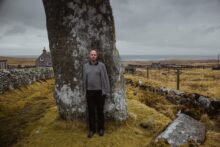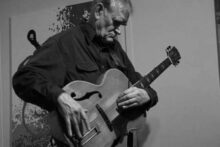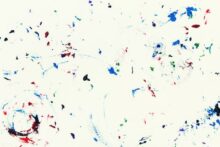With dozens of gigs taking place over nine days, EFG London Jazz Festival can be an overwhelming affair. From big name shows in swish concert halls to jam sessions in grimy basements, the 32-year-old event pretty much runs the gamut of jazz presentation. To help audiences navigate the huge programme, the organisers have identified several strands: Icons, Jazz Visionaries, New Creations, Home Grown, Beyond Margins, Voices and Beyond Borders. There’s no shortage of big American names appearing – Billy Cobham, Pat Metheny, Julian Lage, Robert Glasper, Mesheel Ndegeocello, Charles Tolliver, Anhoni, Tashi Wada, Marc Ribot, Brandee Younger, Cyrille Neville – alongside international stars like Seun Kuti, Roberto Fonseca and the brilliant South African pianist Nduduzo Makhathini. UK artists have a major presence at the festival, from legends like Dave Holland and Courtney Pine to emerging artists from London and Glasgow’s contemporary scenes. But let’s get down to the nitty gritty and pick out four particularly enticing events, from two radical reimaginings of the jazz tradition to freewheeling improvised sessions and rare footage of first-generation British improvisers.
[Ahmed]
This has been a halcyon year for [Ahmed], the supergroup of Pat Thomas, Seymour Wright Joel Grip and Antonin Gerbal, so it’s fitting that they’re capping it with this headline gig at King’s Place. Spring saw the release of Giant Beauty, a monumental boxset documenting their five-day residency at Stockholm’s Edition festival in 2022, and Wood Blues, a double LP capturing their ecstatic performance at Glasgow’s Counterflows festival the same year. One of the greatest live bands on the planet, [Ahmed] take as their starting point the compositions of Ahmed Adbul-Malik, a double bassist and oudist who played with Thelonious Monk, Art Blakey and John Coltrane, and pioneered a fusion of bebop, modal jazz African and Arabic music on the series of albums he released between 1959 and 1964.
As Thomas has noted, Abdul-Malik’s music is a radical attempt by a black American musician to reconnect with the pan-Islamic musical tradition passed down by his ancestors through jazz and blues. As a practicing Muslim himself, Thomas has long sought to explore those connections through his own music, including the brilliant solo piano album The Solar Model of Ibn Al-Shatir, released on Otoroku this September. With its Cecil Taylor-like clusters, Monkian slants, and echoes of stride and calypso, Thomas’s piano playing is part of the rhythm engine driving [Ahmed], as he locks in with Grip’s double bass and Gerbal’s drums to push melodies and motifs from Abdul-Malik to impossible heights of repetition and tightly coiled improvisation. On alto saxophone, Wright resists the urge to blow freely, working over pithy phrases to explore subtle variations in pitch, timbre and phrasing. His vocabulary of quacks, peeps and brays challenges can be divisive – following an [Ahmed] gig in France, one promoter told Thomas he’d book the band, but only as trio without the saxophone – yet it’s an integral part of what makes [Ahmed] so special, challenging listeners’ expectations of what a jazz band can be.
Yet as radical as [Ahmed]’s interrogation of jazz tradition is, it’s also deeply joyful. That Counterflows gig was genuinely transcendent, with the audience dancing their way out of the post-Covid funk. People were going wild, as if they were experiencing a peak Underground Resistance or Jah Shaka set. As Gerbal told me, “Who says free music can’t dance? Young people catch this energy. And to me, it’s questioning the role of the audience as a part of the process. The music we do is a projection of us, but also of themselves. It’s a collective joy.” Whether playing a chilly Glasgow warehouse or a well-appointed concert hall, [Ahmed] transform a space and the people within it. Unmissable.
[Ahmed] plus Elaine Mitchener & Neil Charles, Kings Place, Friday 22 November
Xhosa Cole FreeMonk
Xhosa Cole’s duo with Mark Sanders was a highlight of last year’s festival. Supporting Irreversible Entanglements, the young Birmingham based tenor saxophonist (pictured above) created intimacy in the cavernous Hackney Earth theatre, captivating the audience with a deeply sensitive presentation of the art of the duo. Two years on from launching his second album Ibeji at the festival, Cole returns as a headliner with a new project, FreeMonk. Cole already has an established relationship with the music of Thelonious Monk, having toured last year with a programme of fresh-sounding neo-bop takes on that genius’s incomparable songbook. The album, On A Modern Genius Vol. 1, drops in January and comes highly recommended. FreeMonk, as the name suggests, is that project’s avant-garde mirror, with Cole and the band – Pat Thomas (piano), Josh Vadivelloo (bass) and Peter Newman (drums) plus guests Byron Wallen (trumpet) and Hans Koller (euphonium) – reimagining the material through an innovative contemporary lens.
“FreeMonk is an expansion and abstraction of the project that we recorded,” explains Cole. “It’s the music that we’re moving towards on the album where the melodies, motif and riffs take precedence over the form and standard harmony. With the FreeMonk project we are collaging Monk’s work and opening new possibilities for approaching his music in ways I’ve not come across in an ensemble setting before. The idea is to free Monk’s music from becoming a museum piece, to approach his compositions in a radically new way as he has already recorded them all perfectly. Josh was in the OAMG band and our connection runs deep. He’s very sympathetic to my relationship between playing straight with a looseness and playing free with a tightness. Pat Thomas is one of the world’s leading Monk scholars and he has already recorded his solo versions of abstracted Monk tunes. I think Pat is the only pianist I would dare to play Monk’s music with. He has integrated all of Monk’s music into liberated gestures. Tim Gilles was an instant click – a drummer who knows Monk’s repertoire, swings beautifully and has an openness I really resonate with. Our featured guests are Hans Koller on Euphonium. Hans taught me my very first, and favourite, Monk tune, ‘Played Twice’ when I was around 14. And Byron Wallen a scholar, archivist and musician’s musician.”
Xhosa Cole FreeMonk, King’s Place, Sunday 24 November
Moment’s Notice: Courtney Pine, Yazz Ahmed, Femi Koleoso, Petter Eldh, Farida Amadou
George Nelson’s photographs offer vivid documentation of London’s contemporary jazz scene. He also curates Moment’s Notice, a monthly event where ad hoc ensembles perform completely improvised sets. For this special London Jazz Festival edition, Nelson brings together an intriguingly diverse collection of musicians to perform one-off duo, trio and quintet sets. As one of the major figures in UK jazz, Courtney Pine needs little introduction. He’s joined by British-Bahrani trumpeter Yazz Ahmed, Ezra Collective drummer Femi Koleoso, Swedish double bassist Petter Eldh and Belgian electric bassist Farida Amadou. An accomplished beat-maker as well as a virtuoso bassist, Eldh has been on a hot streak of late, fusing contemporary jazz and underground hip-hop in projects like Koma Saxo and Økse, and anchoring the avant-garde piano trio Punkt.Vrt.Plastik. He’s an ideal figure to bridge Koleoso’s groove-based approach and Amadou’s intensely hypnotic noise-making, as heard on her superb recent album, When It Rains, It Pours. Pine’s classic jazz chops are undeniable, while his exploration of diasporic electronic sounds and interest in avant-garde composers like Boulez mean anything is possible. Ahmed is renowned for her deft use of Arabic scales and dubby electronics, adding a further layer of intrigue to proceedings. Of course, we can speculate all we like; the beauty of events like these is that anything can happen, which gives them a life-affirming spontaneity that can sometimes be lacking in the more formalised festival sets. And that’s where the spirit of the music truly lies.
Nelson says, “One of my oldest friends is a filmmaker/photographer called Peter Mann, who’s father is the late blind painter, Sargy Mann. It would always slightly frustrate Peter when folks went on about how great Sargy’s figurative paintings were considering he couldn’t see, when to him it was more interesting to observe whether the paintings are so good because he was blind. This is very much how I feel about Moment’s Notice improvs. I generally match musicians who have little or no history of improvising together. Not for novelty or because I believe I know best, but rather i feel that so long as consideration is given to the juxtaposition of musicians’ temperaments/archetypes, then the music is often more interesting for this lack of familiarity rather than in spite of it. Unfamiliarity is what brings the curiosity, the listening, the push and pull negotiation, sometimes even the formation of a new language, the absence of genre tropes (including the free improv ones!) and ultimately the risk.”
Moment’s Notice, Union Chapel, Sunday 24 November
Jazz On Screen: ‘So Watt’, Jazz and Improvisation on British TV
There’s some strong programming for this year’s Jazz On Screen strand, from classic Duke Ellington shorts to a double bill of films soundtracked by Max Roach: Gianni Anico’s Noi insistiamo. Suite per la libertà subito and Koreyoshi Kurahara’s Black Sun, a freewheeling portrait of post-war Tokyo. Curated by writer, researcher and broadcaster Ian Greaves, ‘So Watt’ celebrates the rare incursions of progressive jazz and free improvisation onto British television in the 1970s. One of the legends of that scene, the great vocalist, pianist and composer Maggie Nicols, joins Greaves and Stewart Lee – a noted fan of the music who has heroically snuck free improvisers like Alan Wilkson and Sarah Gail Brand into his TV shows – to discuss the footage and provide context.
“In this age of plenty and easy access, it’s hard to imagine a time when improvisation or any kind of experimental music was barely accessible,” says Greaves. “There was no easy entry point so the impact of a broadcast such as these could be huge. David Toop described it back then as being like ‘the unattainable idol on top of a mountain’. With ‘So Watt’ we’ll take the audience back to an age of three channels, where to make it onto television at all was incredibly rare.”
The event features the earliest known footage of Derek Bailey with his trio Iskra 1903 from a 1973 edition of Omnibus (“worth the entry price alone” adds Greaves), Spike Milligan (the UK comedy and jazz connections run deep!) introducing the Tony Oxley Unit on
Open Door, an early example, Greaves notes, of access programming, bringing community groups into the BBC’s London studios to deliver their message. There’s also wild footage of saxophonist Evan Parker and Payul Lytton from London Weekend Television’s Aquarius, filmed at Camden’s Unity Theatre, a beautiful venue sadly lost to fire only months after the recording in 1975.
Greaves was struck by how sympathetic the programmes were to the music. “Back then experimental music would tend to get treated as novelty, but these are serious attempts to represent work at the vanguard. Your typical camera crews were not trained to capture music being created in the moment, so there’s a freefall edginess to the presentation as well. Iskra 1903 are shot so dynamically, that the director wrote to the head of the film unit to thank them for their special effort. The film has lost none of its power half a century on.
“We’re looking forward to hearing from Maggie Nicols about the Open Door programme, which is significant for being organised and made by women from the UK jazz scene. These were pioneers who campaigned for airtime for jazz, so that UK musicians could make a living and get the exposure they deserved. With Open Door they were handed fifty-minutes of television to do whatever they liked.”
So Watt, Barbican, Saturday 16 November
For more information, please visit the EFG London Jazz Festival website





